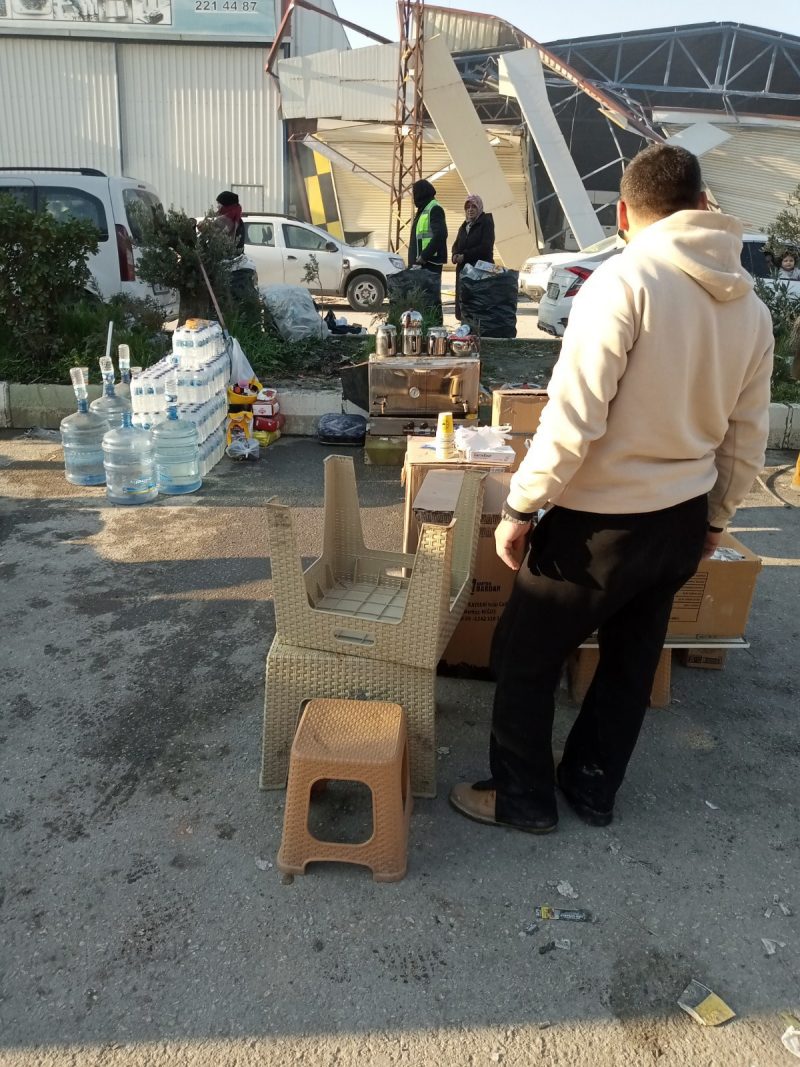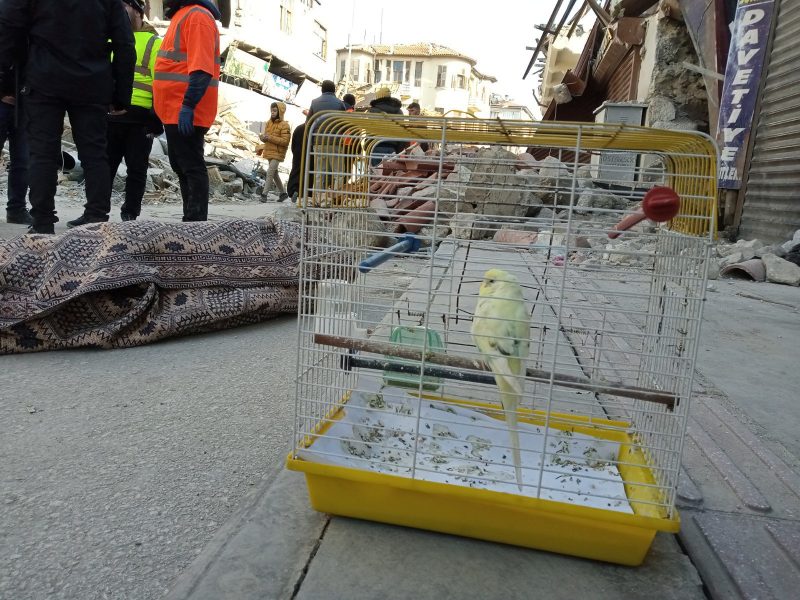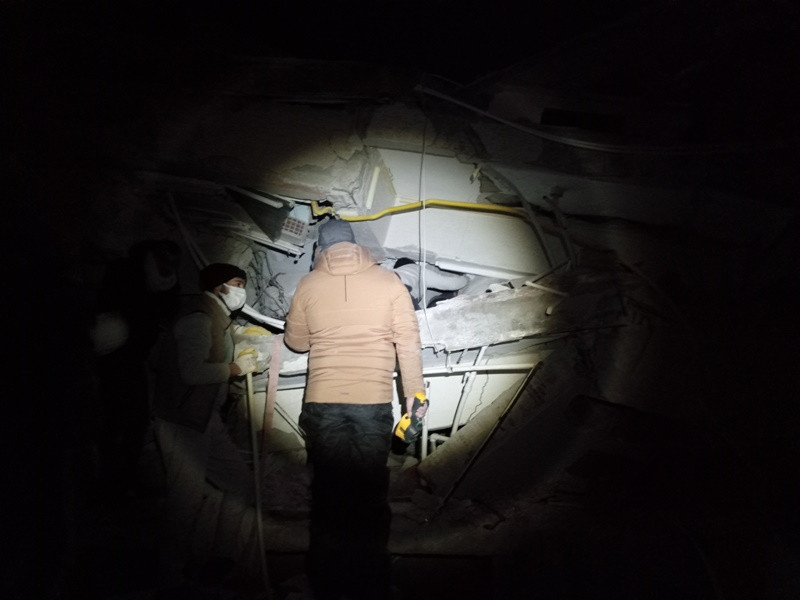By Caner Karavit, writing from Hatay / Türkiye
We see the first images of the disaster via the cities of İskenderun and Belen and Ceyhan to help fighting the destruction of the earthquake. We aim to free the relatives of my former students, alive or dead, from the rubble of the Altıyüz Evler neighborhood and the old bazaar in the city center. We position ourselves by the side of a 6-floor-building that is lying on its side, its next move unpredictable, and meet those who have come to help. We’re looking for access from all four sides of the collapsed apartment building. Search and rescue teams are constantly coming and shouting: “Does anyone hear my voice?” Since the two brothers, whose family was in the ruins, said that there was an answer to these shouts at noon, the search and rescue teams are trying to get inside as much as they can.
Masters of search and rescue
Military search and rescue teams, AFAD (Disaster and Emergency Management Presidency – department of the Ministry of Interior), miners, Akut (search and rescue NGO), teams from various parts of Türkiye, and individuals who came to help on their own initiative come and go to both the building we are facing and to others around.
Since the condition of the building is very dangerous, we try to enter first from the front and then from the back. However, when all the items on the kitchen side are cleaned, the overturned beam comes out, impossible to continue. Still, no one gives up. During my observations I divide the incoming search and rescue teams into two classes. First; Classic search and rescue teams. Second: The “hope providing” teams. The latter are amateur groups that indirectly inform you, when it’s almost impossible to get someone out of the dent, but they don’t let you lose hope.
Some of them are extremely brave and enter the ruins without hesitation to call out for possible survivors. If there is no sign, they go out and say: “We came here to save the dented, alive or dead. When you say “go”, we get in and get them out no matter what.” Once you give the ‘go’ they say “We’re going to get the tools” and leave. Then other teams come and go and you don’t lose hope.
But when you hear these words a few times, you realize that there is no hope, but such teams ensure that you do not suddenly lose hope, that is, they get you closer to the reality. These are the “maters of hope”.

Tea, soup masters
You see the important role things play in our common culture in disaster situations. For example, there are some drinks that are common cultural assets. In our culture, it is tea. Since the first day we were positioned among the landslides, the teahouse established by two friends who brought the tea stove from Istanbul to their car has become the common meeting point of the whole region. The conversations made while drinking tea kept the moral alive.
Despite being a heavy coffee drinker, I once again experienced how important tea is to our society as a social drink. Even though their tea is not perfectly brewed, I consider them as “masters of social needs determination” because they have identified this social need and provided social service from the first days of the disaster.
Moreover, they are taking the job of the teahouse very seriously. By getting out of their cars at the first light of the morning, cleaning and watering the surroundings of the tea house and carefully arranging the open breakfast counter, they helped us all to start the day in good spirits. Also, there were the soups that were constantly distributed in the trucks. It would not be an exaggeration to say that these were some of the most delicious soups I’ve ever had in my life.

Masters of excavator
Excavators are known as rough machines, and their work shows that. However, as I carefully studied the digger works in Antakya, I gave up the judgment that this machine was a rough one. The masters of excavators used their shovels with such precision, especially in areas where the dents were detected, that I can say that they did millimeter work.
They clear the rubble with delicate touches, like craftsmen making fine carvings on concrete. As soon as any life triangle or breach appears, the whistle scoop is pulled back with great weight and precision. This whistle alert is a call for the search and rescue team and a sound of hope for those who are waiting for their relatives.
Masters of repelling fake news
If I am not mistaken, it was the third night of our arrival in Antakya. We were lying in the car and had just fallen asleep when someone punched our window and said, “Run! The dam has collapsed in Hatay, there is a flood coming,” he shouted. There was an atmosphere of confusion and panic all around us. People trying to escape by filling the municipal buses and minibuses blocked the road. When we saw that our friend was not behind the car, we got out of the car and started searching. At that moment, someone said with a loud voice: “Where are you going? Is there a dam in Hatay so that it will burst?” We woke up suddenly. This “repellent” voice that brought us to ourselves has also made many people come back.
I immediately grabbed the phone and phoned Mustafa İlker Yücel to confirm the news. When we said in a calm voice, “We have not received such news”, we erased the dirty information from our minds. Unfortunately, this dirty information stopped the search and rescue efforts for a while and it took time for the work to start again. The fire we lit in that tumult was also about to die out, so we gathered trees from the ruins and rekindled the fire. With the returnees, the area around the fire became more and more crowded. Actually, there was a dam in Hatay, but it was far away. Still, “Is there a dam in Hatay?” I wanted to give credit to the “master of repelling fake news” who rumbled and brought us to ourselves.

The mastery rising from below the rubble
There is also the situation of our craftsmen and craftsmen who maintain our cultural heritage in the earthquake zone. Some of them lost their lives under the rubble, some of them lost their families. Almost all of them lost their workshops or shops.
After overcoming the critical period in the earthquake zone, projects should be prepared urgently for the sustainability of our cultural heritage. First of all, the interruption of master-apprentice education should not be allowed and supportive steps should be taken as soon as possible for the continuity of this education. It is clear that the realization of investments that will strengthen the motivation of human resources will be a great source of morale in healing the wounds.
















Leave a Reply